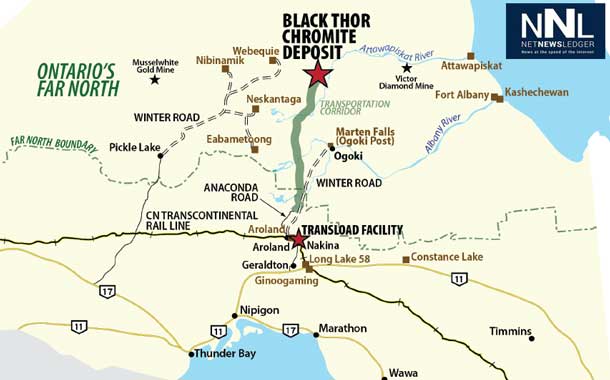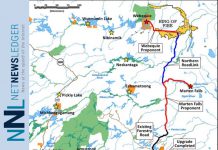TORONTO – MINING – Red Pine Exploration Inc. (TSX-V: RPX) (“Red Pine” or the “Company”) has received results from composite grab1 samples collected during its field mapping program as well as for holes SD-16-41 to SD-16-43 and part of SD-16-44 from its on-going drilling program at the Wawa Gold Project.
Highlights from the field mapping results include:
- Up to 143.1 g/t gold in a composite grab1 sample (>1kg) taken in a quartz vein located 445 metres ENE of the Darwin-Grace Mine (Table 1 and Figure 1); in which channel samples taken during the production period in the 1920-1930s contained up to 2146 g/t gold over 0.91 metre;
- The discovery of a shear zone with quartz veins 235 metres ENE of the Darwin-Grace Mine – composite grab1samples contain 3.42 g/t and 1.65 g/t gold; and
- The discovery of gold mineralization zones south of the Surluga Deposit with composite grabsup>1 samples containing up to 3.16 g/t gold. The mineralization is similar to the William Gold Zone and possibly associated with the historic intersection of 2.37 g/t gold over 6.71 metres in hole S300 (Table 2).
1Readers are cautioned that composite grab samples are taken over a representative length in the targeted shear zone or vein but remain selective by nature. The grades and mineralization present are not necessarily representative of other mineralization that may be identified on the property.
Highlights from the drilling results include:
- Near surface quartz vein networks in the hanging wall of the Surluga Deposit form large zones of mineralization with 1.61 g/t gold over 26.25 metres, including 15.83 g/t gold over 1 metre, in SD-16-44 (Table 2 and Figure 2);
- 2.00 g/t gold over 8.96 metres and 0.59 g/t gold over 4 metres in the Jubilee Shear Zone and 0.57 g/t gold over 17.2 metres in the Hornblende Shear Zone/Surluga Road Shear Zone, 525 metres north of the inferred resource2 in SD-16-43 (Table 2 and Figure 2);
- Higher grade mineralization in the Surluga Road Shear Zone with 7.46 g/t gold over 1.43 in SD-16-41 (Table 2 and Figure 2); and
- • The presence of visible gold3 in the Jubilee Shear Zone in both SD-17-50 and SD-17-51 that are testing the near surface extension of the structure not-included in the inferred resource.
Quentin Yarie, President and Chief Executive Officer of Red Pine states, “We are quite excited to see that the gold content of the Jubilee Shear Zone in hole SD-16-43, located 525 metres north of the inferred resource boundary, is comparable to the gold content of the shear zone in the inferred resource. This supports our exploration model that the inferred resource extends near surface to the north. In addition, the discovery of additional high-grade quartz veins and a gold-bearing shear zone near the Darwin-Grace Mine indicate that gold mineralization extends beyond the immediate area of the mine and warrants additional exploration.”.
Field Mapping Results
Containing 143.1 g/t gold, a quartz vein located 444 metres ENE of the Darwin-Grace Mine has the highest gold grade measured by the Company in a composite grab1 sample so far and indicates that additional high-grade quartz veins exist in the area. Combined with the nearby identification of another gold-bearing shear zone, this expands the exploration opportunities near the historic Darwin-Grace Mine in which channel samples taken during the production period in the 1920-1930s contained up to 2146 g/t gold over 0.91 metre.
The identification of William-like gold mineralization south of the Surluga Deposit, with composite grab samples in altered and weakly sheared diorite containing up to 3.16 g/t gold, indicate the extension of this mineralization styles of the Wawa Gold Corridor in an area that remains entirely under-explored. This is providing a framework to explain the intersection of 2.37 g/t gold over 6.71 metres in hole S300 and the cryptic nature of the mineralization intersected in that hole. With additional work to better constrain the geological controls on the gold distribution in the area, this zone of mineralization can become a near future exploration target south of the inferred resource boundary.
Drilling Results
Hole SD-16-43 was drilled close to the highway 101 to test the hypothesis that the Jubilee, Surluga Road and Hornblende Shear Zones of the Wawa Gold Corridor extend at least to the highway and remain mineralized. Hole SD-16-43 successfully intersected the three structures as well as gold mineralization with grade and width comparable to the inferred resource. Some uncertainty remains on the exact trace of the Hornblende Shear Zone and the Surluga Road Shear Zone as the current modelling indicates that both structures merge close to a mineralized intersection below the Jubilee Shear Zone. Additional exploration work will be necessary to resolve this uncertainty and better discriminate the gold zones in this area that remains under-explored. Hole SD-16-44 shows that near surface quartz vein networks in the hanging wall of the Surluga Deposit can form large zones of mineralization formed of multiple quartz veins. The geometry and gold content of those quartz vein networks remains to be defined and quantified in most of the deposit. Hole SD-16-41 and SD-16-42 were drilled to test the northern boundary of the Surluga Deposit. Results from these holes indicate that gold mineralization in both the Jubilee Shear Zone and Surluga Road Shear Zone improves with increasing depth. The Jubilee Shear Zone hosts the Surluga Deposit – the currently defined 1,088,000 ounces inferred resource2 of the Wawa Gold project.
Table 1- grab* samples collected south of the inferred resource boundary
|
Sample |
Area |
Sample type |
Au (g/t) |
| 18464 |
Darwin-Grace area |
Shear Zone |
0.36 |
| 18482 |
Darwin-Grace area |
Quartz vein |
143.1 |
| 18492 |
Darwin-Grace area |
Shear Zone |
1.65 |
| 18493 |
Darwin-Grace area |
Quartz vein in shear zone |
3.42 |
| 1473370 |
S300 Zone |
Altered and weakly sheared diorite |
3.16 |
| 1473380 |
S300 Zone |
Altered diorite |
1.32 |
* Readers are cautioned that composite grab samples are taken over a representative length in the targeted shear zone or vein but remain selective by nature. The grades and mineralization present are not necessarily representative of other mineralization that may be identified on the property.
Table 2 – Highlights of drilling results in the Wawa Gold Corridor
| Hole No |
From (m) |
To (m) |
Length (m)* |
Gold (g/t) |
Gold structure |
| SD-16-41 |
89 |
90 |
1 |
1.07 |
Jubilee Shear Zone |
|
113 |
114.6 |
1.6 |
1.3 |
||
|
160.66 |
162.09 |
1.43 |
7.46 |
Surluga Road Shear Zone |
|
| SD-16-42 |
95.93 |
99.13 |
3.2 |
0.5 |
Surluga Road Shear Zone |
| SD-16-43 |
43.94 |
69.7 |
25.76 |
0.79 |
Jubilee Shear Zone |
|
including |
|||||
|
43.94 |
52.9 |
8.96 |
2.00 |
||
|
65.7 |
69.7 |
4 |
0.59 |
||
|
104.8 |
122 |
17.2 |
0.57 |
Hornblende Shear Zone/Surluga Road Shear Zone |
|
|
including |
|||||
|
114.46 |
122 |
7.54 |
0.76 |
||
| SD-16-44 |
24.57 |
50.82 |
26.25 |
1.61 |
Quartz Vein Network |
|
including |
|||||
|
40.82 |
50.82 |
1 |
15.83 |
||
* Assay results reported over intersection length estimated in the Jubilee and Hornblende Shear Zone to represent >85% true width; As they represent discoveries, no true width estimation is currently defined for the intersection in the Quartz Vein Network and the Surluga Road Shear Zone.
On-going Drilling Program
The on-going diamond drill program is focused on expanding the Surluga Deposit to the north. Hole SD-17-51 targeted the Wawa Gold Corridor 200 metres north of SD-16-40. Visible gold3 was observed in the Jubilee Shear Zone in both SD-17-50 and SD-17-51 in the shallow extension of the structure generally not-included in the inferred resource because of the absence of historic holes.
Figure 1. Highlights of composite grab* samples collected south of the Surluga Deposit inferred resource in the S300 zone and near the historic Grace-Darwin Mine

Figure 2. Fall/Winter 2016/2017 Drill Program – location of drill holes

On-site Quality Assurance/Quality Control (“QA/QC”) Measures
Drill core samples were transported in security-sealed bags for analyses at Activation Laboratories Ltd. in Timmins, Ontario. Individual samples are labeled, placed in plastic sample bags and sealed. Groups of samples are then placed into durable rice bags and then shipped. The remaining coarse reject portions of the samples remain in storage if further work or verification is needed.
Red Pine has implemented a quality-control program to comply with best practices in the sampling and analysis of drill core. As part of its QA/QC program, Red Pine inserts external gold standards (low to high grade) and blanks every 20 samples in addition to random standards, blanks, and duplicates.
Qualified Person
Quentin Yarie, PGeo., is the qualified person responsible for preparing, supervising and approving the scientific and technical content of this news release.
About Red Pine Exploration Inc.
Red Pine Exploration Inc. is a gold and base-metals exploration company headquartered in Toronto, Ontario, Canada. The Company’s common shares trade on the TSX Venture Exchange under the symbol “RPX”.
Red Pine has a 60% interest in the Wawa Gold Project with Citabar LLP holding the remaining 40% interest. Red Pine is the Operating Manager of the Project and is focused on expanding the existing gold resource on the property.
For more information about the Company visit www.redpineexp.com
2NI 43-101 inferred resource of 1,088,000 ounces of gold at a 1.71 grams per tonne (g/t) using a 0.40 g/t gold cut-off grade for pit-constrained and 2.50 g/t gold cut-off grade for underground-constrained resources, contained in 19.82 million tonnes open along strike and at depth. The Cut-off grades are based on a gold price of US$1,250 per once and a gold recovery of 95 percent (Mineral Resource Statement*, Surluga-Jubilee Gold Deposit, Wawa Gold Project, Ontario, SRK Consulting (Canada) Inc (effective May 26, 2015)). The report is available on www.SEDAR.com under Red Pine’s profile.
3Gold visible with the naked eye – “visible gold”






